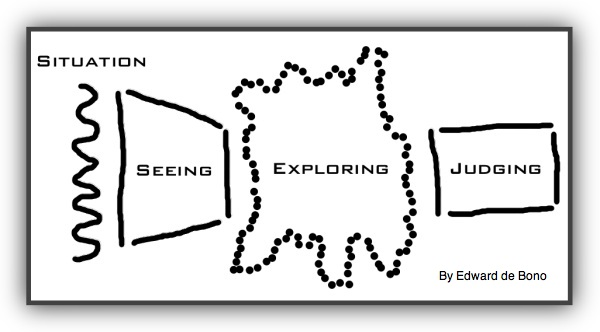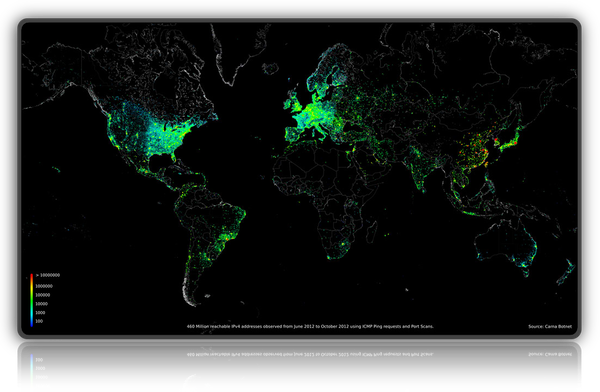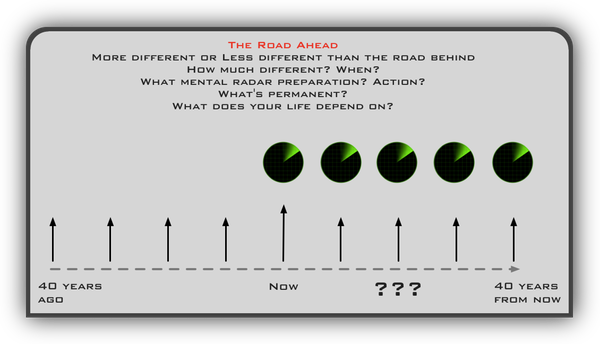

A smorgasbord of topics and conceptsThis page is a work in progress Page contents

What do you see, so you can decide on your informed priorities and what to do next 


Since information knows no national boundaries, it will also form new transnational communities of people who, maybe with out ever seeing each other in the flesh, are in communion because they are in communication 
Unless you do something different you will take the mental patterns of yesterdayS into tomorrowS without realizing it. This tendency lies behind every crisis: political, corporate, career, relationship News ticker — a changing world ThinkingThinking is the knowledge worker’s specific work; it is his/her “doing.” Peter Drucker —the uber mentor Organizations, the economy, worldviewA “multi-time dimensional” economic view Organization efforts problems or opportunities Innovation in the existing organization requires special effort The failure to understand the nature, function, and purpose of business enterprise Work-lifeA knowledge specialty based on formal and right kind of education (rather than apprenticeship or experience) that is mobile , taking on one assignment after the other based on one’s competencies in a highly specialized organization designed for its task, function, ecology in a network society using information as your primary resource, life-long learning and continuing education , the second-half of your life (see below) The Josh Abrams story and starting with an idea outside of yourself Taking career responsibility from The Daily Drucker Interview: Post-Capitalist Executive Interview: Managing in a Post Capitalist Society … there is in the West a growing number of people who, while not themselves executives, have come to see management as an area of public interest; … there are also an increasing number of students in colleges and universities who, while not necessarily management students, see an understanding of management as part of a general education; and, finally, there are a large and rapidly growing number of mid-career managers and professionals who are flocking to advanced-executive programs, both in universities and in their employing organizations. I. MANAGEMENT
II. THE INDIVIDUAL III. SOCIETY (also see Post-Capitalist Society)
Afterword: The Challenge Ahead
Managing In A Time Of Great Change A century of social transformation The future that has already happenedThe Productivity of the New Work Forces The new challenge facing the post-capitalist society is the productivity of knowledge workers and service workers. To improve the productivity of knowledge workers will in fact require drastic changes in the structure of the organizations of post-capitalist society, and in the structure of society itself. Unless we can learn how to increase the productivity of knowledge workers and service workers, and increase it fast, the developed countries will face economic stagnation and severe social tension. Luther, Machiavelli, and the Salmon (note the patterns) The railroad made the Industrial Revolution accomplished fact. What had been revolution became establishment. The next two or three decades are likely to see even greater technological change than has occurred in the decades since the emergence of the computer, and also even greater change in industry structures, in the economic landscape, and probably in the social landscape as well. Peter observed that we are now in another critical moment: the transition from the industrial to the knowledge-based economy … We should expect radical changes in society as well as in business. Making the future"One thing is certain for developed countries—and probably for the entire world: We face long years of profound changes. The changes are not primarily economic changes. They are not even primarily technological changes. They are changes in demographics, in politics, in society, in philosophy and, above all, in worldview. Economic theory and economic policy are unlikely to be effective by themselves in such a period. And there is no social theory for such a period either. Only when such a period is over, decades later, are theories likely to be developed to explain what has happened. But a few things are certain in such a period. It is futile, for instance, to try to ignore the changes and to pretend that tomorrow will be like yesterday, only more so. This, however, is the position that existing institutions tend to adopt in such a period—businesses as well as nonbusinesses. It is, above all, the policy likely to be adopted by the institutions that were most successful in the earlier period before the changes. They are most likely to suffer from the delusion that tomorrow will be like yesterday, only more so. Thus it can be confidently predicted that a large number of today’s leaders in all areas, whether business, education or health care, are unlikely still to be around thirty years hence, and certainly not in their present form. But to try to anticipate the changes is equally unlikely to be successful. These changes are not predictable. The only policy likely to succeed is to try to make the future. Changes of course have to fit the certainties (which this book attempted to outline in the preceding chapter). Within these restraints, however, the future is still malleable. It can still be created. To try to make the future is highly risky. It is less risky, however, than not to try to make it. A goodly proportion of those attempting to do what this chapter discusses will surely not succeed. But, predictably, no one else will." (survive?) "The twenty-first century will surely be one of continuing social, economic, and political turmoil and challenge, at least in its early decades. The Age of Social Transformations is not over yet. And the challenges looming ahead may be more serious and more daunting still than those posed by the social transformations that have already happened, the social transformations of the twentieth century" Next stops |